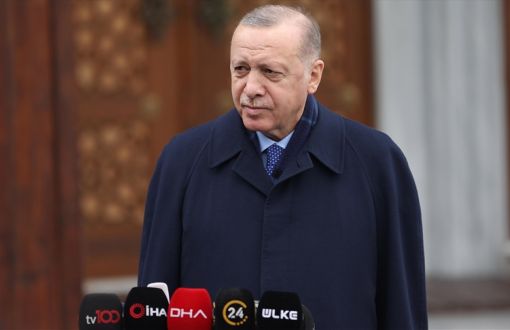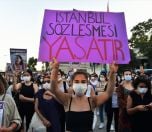Photo: AA
Click to read the article in Turkish
President and Justice and Development Party (AKP) Chair Recep Tayyip Erdoğan has said that his decision to pull Turkey out of the İstanbul Convention was "completely legal."
Erdoğan issued a presidential decision at midnight on March 20, declaring Turkey's withdrawal from the convention, a move that has drawn fierce opposition from women's rights defenders and opposition parties.
Critics point out that the convention had been ratified by the parliament and its approval is needed for a withdrawal.
"This is not a decision to be taken by the parliament. The step that the Presidency took is completely legal," Erdoğan told reporters in İstanbul following the Friday prayers. "We have made the decision to exit, and notified them about the situation. So, this is a done deal."
CLICK - Women take to streets in İstanbul for İstanbul Convention
CLICK - Women on the streets: 'We don't accept one man's decision'
According to Turkey's Constitution, international agreements put into effect have the force of law and prevail over laws in case of conflict and presidential decrees can't be against laws.
However, article 3 of Presidential Decree No. 9, on which the withdrawal was based, says that the ratification or termination of international treaties is made by a presidential decision, another type of executive action. Therefore, Erdoğan says his action was legal.
Turkey in 2011 became the first country to ratify the İstanbul Convention in its parliament with all parties unanimously supporting it. Erdoğan was the prime minister at the time.
Over the past few years, there has been a rift within pro-AKP and conservative circles over the convention with some pressing the government for a withdrawal while some supporting it.
CLICK - Campaign Against İstanbul Convention in Pro-AKP Circles
CLICK - Conservative women: Violence against women is a problem above ideologies
CLICK - Association close to Erdoğan's family announces support for İstanbul Convention
From İstanbul ConventionThe purposes, definitions and general obligations of the The Council of Europe Convention on Preventing and Combating Violence Against Women and Domestic Violence are indicated in its first chapter of the as follows: Chapter I – Purposes, definitions, equality and non-discrimination, general obligations Article 1 – Purposes of the Convention The purposes of this Convention are to: a) protect women against all forms of violence, and prevent, prosecute and eliminate violence against women and domestic violence; b) contribute to the elimination of all forms of discrimination against women and promote substantive equality between women and men, including by empowering women; c) design a comprehensive framework, policies and measures for the protection of and assistance to all victims of violence against women and domestic violence; d) promote international co-operation with a view to eliminating violence against women and domestic violence; e) provide support and assistance to organisations and law enforcement agencies to effectively co-operate in order to adopt an integrated approach to eliminating violence against women and domestic violence. In order to ensure effective implementation of its provisions by the Parties, this Convention establishes a specific monitoring mechanism. Article 2 – Scope of the Convention This Convention shall apply to all forms of violence against women, including domestic violence, which affects women disproportionately. Parties are encouraged to apply this Convention to all victims of domestic violence. Parties shall pay particular attention to women victims of gender-based violence in implementing the provisions of this Convention. This Convention shall apply in times of peace and in situations of armed conflict. Article 3 – Definitions For the purpose of this Convention: a) "violence against women" is understood as a violation of human rights and a form of discrimination against women and shall mean all acts of gender-based violence that result in, or are likely to result in, physical, sexual, psychological or economic harm or suffering to women, including threats of such acts, coercion or arbitrary deprivation of liberty, whether occurring in public or in private life; b) "domestic violence" shall mean all acts of physical, sexual, psychological or economic violence that occur within the family or domestic unit or between former or current spouses or partners, whether or not the perpetrator shares or has shared the same residence with the victim; c) "gender" shall mean the socially constructed roles, behaviours, activities and attributes that a given society considers appropriate for women and men; d) "gender-based violence against women" shall mean violence that is directed against a woman because she is a woman or that affects women disproportionately; e) "victim" shall mean any natural person who is subject to the conduct specified in points a and b; f) "women" includes girls under the age of 18. Article 4 – Fundamental rights, equality and non-discrimination Parties shall take the necessary legislative and other measures to promote and protect the right for everyone, particularly women, to live free from violence in both the public and the private sphere. Parties condemn all forms of discrimination against women and take, without delay, the necessary legislative and other measures to prevent it, in particular by: –embodying in their national constitutions or other appropriate legislation the principle of equality between women and men and ensuring the practical realisation of this principle; –prohibiting discrimination against women, including through the use of sanctions, where appropriate; –abolishing laws and practices which discriminate against women. The implementation of the provisions of this Convention by the Parties, in particular measures to protect the rights of victims, shall be secured without discrimination on any ground such as sex, gender, race, colour, language, religion, political or other opinion, national or social origin, association with a national minority, property, birth, sexual orientation, gender identity, age, state of health, disability, marital status, migrant or refugee status, or other status. Special measures that are necessary to prevent and protect women from gender-based violence shall not be considered discrimination under the terms of this Convention. Article 5 – State obligations and due diligence Parties shall refrain from engaging in any act of violence against women and ensure that State authorities, officials, agents, institutions and other actors acting on behalf of the State act in conformity with this obligation. Parties shall take the necessary legislative and other measures to exercise due diligence to prevent, investigate, punish and provide reparation for acts of violence covered by the scope of this Convention that are perpetrated by non-State actors. Article 6 – Gender-sensitive policies Parties shall undertake to include a gender perspective in the implementation and evaluation of the impact of the provisions of this Convention and to promote and effectively implement policies of equality between women and men and the empowerment of women. |
(EMK/VK)











